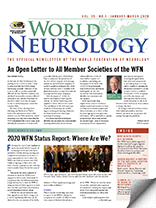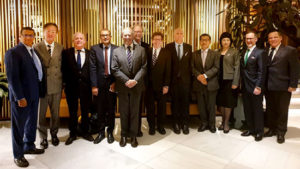
WFN trustees, regional directors, and WFN President William Carroll (fifth from the left), AAN President James Stevens (second from the right) and EAN Claudio Bassetti (not pictured)
Following the end of 2019, highlighted by the successful World Congress of Neurology (WCN) in Dubai and a productive two-day strategy meeting just completed in mid-January in London, it seems appropriate to review where the WFN now stands as we move into 2020. I make no apology to those who read these columns regularly and who will have noted a similar theme for the first issue of 2019.
This report will cover a number of initiatives in which the WFN is now engaged as well as some future plans. It is important that the WFN membership is kept informed as to what the WFN is doing and why. It will be apparent to those who read this report that each initiative is closely interlinked with the others.
I will list the current endeavors and then expand on each. Before doing so, it is worth emphasizing that these are all directed to the core mission of the WFN, which is to “foster quality neurology and brain health worldwide.”
Visibility
This is a useful, overarching term used in respect of the WFN to enhance its recognition at a number of different levels. It is a means to facilitate the influence of the WFN. Within the world in which we now live, visibility and recognition are essential to reaching key targets, such as the WHO and global regional and national policymakers as well as civil society.
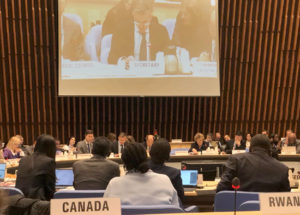
WHO Executive Board in session.
Such visibility and recognition that the WFN seeks benefits all associated organizations from the Global Neurological Alliance (GNA), through the regional WFN oorganizations serving the six WFN regions and of course the member societies and individual neurologists within those member societies.
To do this, the WFN has been in attendance at all important neurological meetings, such as the American Academy of Neurology (AAN), the European Academy of Neurology (EAN), and the PanArab Union of Neurological Societies (PAUNS) major member society meetings during 2019 and plans more WFN exposure at these in 2020.
The WFN is delighted to again join with a key global organization from the GNA, as it did in 2019 with the International Headache Society (IHS), for World Brain Day (WBD). This year’s WBD will be undertaken in partnership with the International Parkinson’s Disease and Movement Disorders Society (IPD and MDS) and promoted again with Yakkety Yak, the media partner from 2019. The collaborative effort spearheaded by Yakety Yak proved to be outstandingly effective (overall reach estimated in excess of 50 million). In 2020, as in 2019, WBD will be a campaign lasting several months and culminate in the IPD and MDS Congress Sept. 13-17 in Philadelphia, Pennsylvania. By allying this campaign with that for the importance of Brain Health, the WFN also hopes to increase its effective reach beyond the previous effort, again to the benefit of all.
As most would know, WBD is the annual partner of the WFN’s highest profile educational event, the biennial World Congress of Neurology (WCN). Plans are nearing completion for the promotion of the XXV WCN, which promises to be a highly successful event Oct. 3-7, 2021, in Rome.
Finally, the WFN trustees agreed during the London strategy meeting in January that the WFN Specialty Groups would be encouraged to both promote their specialty and the WFN and so further assist in the improved visibility of the WFN. (See Specialty Groups section on page 4.)
Inequities of Access, Neurological Non-Communicable Disorders (nNCD) and the Global Burden of Neurological Disorders
No matter how one looks at this, the topic is fundamental to our raison d’etre.
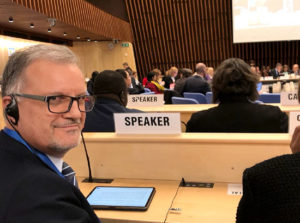
ILAE President, Prof. Samuel Wiebe.
We have made a good start. We have concentrated on Africa and the Sub-Saharan region in particular, following the lead of Johan Aarli in 2006. We now have four active teaching centers in operation in Africa: two each in francophone and anglophone Africa. These address the critical shortage of neurologists in parts of Africa. There are other countries and regions with similar personnel issues and yet others who are inadequately resourced with infrastructure, diagnostic facilities, and access to pharmaceuticals to combat the growing burden of neurological disorders and consequent financial impost.
In an attempt to approach these problems rationally, the WFN requires the information on which to base the relative needs. Consequently, it has begun to collate a registry of “needs.” The registry is to be formed by a modest survey completed by member societies from which it is planned to develop strategies to assist groups of countries with common inequities. It is likely that such plans will involve targeted advocacy campaigns in conjunction with the relevant regional WFN organizations to effect the change in the allocation of national resources. The data provided by the survey will aid this approach particularly for the argument for jurisdictions to re-evaluate the prioritization of their resources to meet the growing burden of nNCDs.
WFN Core Mission
- Visibility
- Inequities of access and the approach to neurological non-communicative disorders (nNCDs) and the global burden of neurological disorders.
- Closer links to the WHO
- Promoting importance of Brain Health
- Global Neurology Alliance
- Educational activities
- WFN Specialty Groups
Closer Collaboration With the WHO
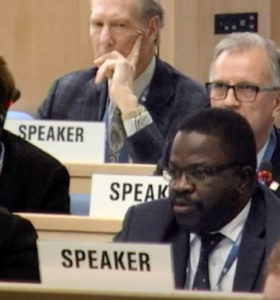
William Carroll, WFN president, at the Executive Board session on Epilepsy, with Action Amos, vice president of IBE, and Prof. Samuel Wiebe, ILAE president.
Although the WFN enjoys the status of being a non-state actor in official relations with the WHO and contributes regularly to the discussion of issues aligned with those of the WFN, its voice when heard is interpreted from the WHO perspective. The WFN therefore is seeking approaches that the WHO can accommodate to aid more rapid and targeted realization of the common goal of reducing inequities of access to quality neurological care within the broader WHO policy framework. The WFN has regularly supported the longstanding WHO initiative on epilepsy together with the International League Against Epilepsy. Indeed, a landmark decision was made by the WHO Executive Board meeting Feb. 6 on this matter. (See separate report on this page). This decision also for the first time acknowledged other neurological disorders that might be addressed synergistically by the same or similar approaches to be developed for epilepsy.
The WFN continues to prosecute the importance of brain health and is pleased with the modest acknowledgement of this in the recent restructuring of the WHO Mental Health and Substance Use department.
On the matter of brain health in general, the WFN is broadening the World Brain Day campaign to incorporate brain health, as mentioned above.
Global Neurology Alliance
The WFN continues to regard this group as an essential player in the promotion of brain health and for more targeted initiatives as they arise. The WFN is pleased to be able to provide a focal point for the Global Neurology Alliance (GNA) and plans to hold information updates at each of the AAN (Toronto) and EAN (Paris) meetings this year.
Educational Activities
This year, the more overt activities will be the World Brain Day (WBD) and planning for the 2021 World Congress of Neurology (WCN). Both of these are key educational events but are also essential elements to the visibility of the WFN. As I mentioned, in the 2019 WBD campaign, the total cumulative potential reach was more than 50 million. For the WCN in Dubai, the estimates for press coverage and social media were even greater. Some of these were detailed in my last President’s Column.
In addition, our educational training program continues. All African training positions have been allocated trainees for 2020, and the annual teaching course organized by the EAN and supported by the WFN, AAN, African Academy of Neurology (AFAN), and others will take place Sept. 23-25 in Kampala, Uganda.
WFN grants for 12-month incubator type research will again be offered for sums up to (USD) $25,000. Junior Traveling fellowships are also offered again (see WFN website), and the number of department visits available have been increased by the addition of more member society departments joining the scheme for short-term observerships.
An important addition to these activities, outside (the WCN and WBD) is the creation of an alumnus for all who have attended one or more of these activities. In January 2020, the WFN decided to offer this option to past and future attendees, to keep a list of them on the WFN website, and to issue a certificate of recognition to both attendees and providers.
Specialty Groups
Finally, WFN Specialty Group (SG) chairs and committees have been rotated as is the usual practice after two years. The WFN thanks all those who have contributed in this arena over 2018 and 2019. Without their efforts, these topics risk being lost to neurology and to the WFN. I am pleased to announce that a new SG has been approved by the trustees. Proposed by Prof. Antonio Federico, who will be the inaugural chair, it will provide an important focal point, educational resource, and active advocacy role for rare neurological diseases. I am also happy to advise that former WFN president, Raad Shakir, will chair the SG Committee, which oversees the process under which the WFN SGs operate. The SG committee will be a valuable resource for those SGs who may require advice in this regard.
In the interests of transparency, the WFN trustees decided in January to require each SG to operate under a Memorandum of Understanding (MOU) which spells out how the SG will operate, use the WFN logo, and where possible promote both the SG topic and the WFN.
I trust that this report provides members with an up-to-date summary of the WFN, what the current goals are, and how it is directing its efforts. In doing so, I acknowledge the hard work undertaken by the trustees and office staff and thank them for their active contributions. •
William Carroll
WFN President
